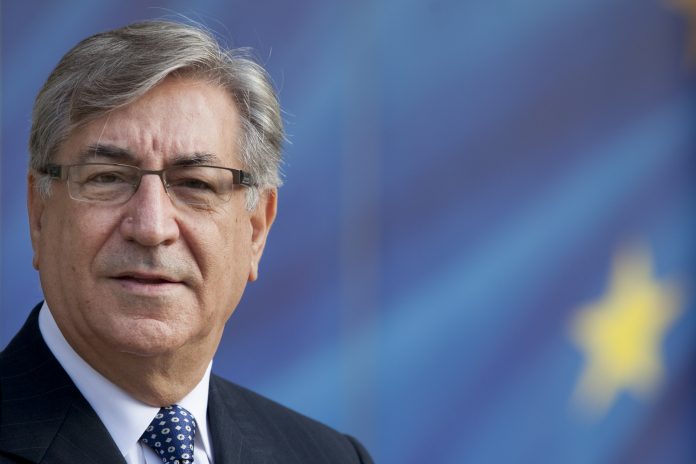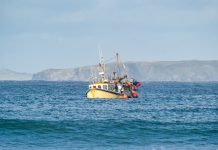Here, we focus on the priorities for the environment, maritime affairs and fisheries, in the work of Karmenu Vella, the European Commissioner for Environment
Karmenu Vella is the European Commissioner for Environment, Maritime Affairs and Fisheries in the European Commission. He was born and brought up in a fishing village in the South of Malta, relying heavily on the maritime economy. This gave him insight into the importance of the sea, for fishermen, the economy and sustaining the environment. He is, therefore, focused on blue growth, via a reworked Fisheries Policy that would allow the rebuilding of the stocks of fish.
From 2014 until now, Karmenu Vella has been responsible for protecting the environment whilst encouraging Europe’s competitiveness and implementing the new Common Fisheries Policy. He further leads the charge to harness the potential of land and sea: both to create sustainable jobs and to make sure those jobs preserve natural resources. He is a leader of managing and governing the planet’s oceans, in association with the global partners of Europe.
He is involved with the Environmental Implementation Review (EIR), which is intended to help Member States apply EU environment rules.
On the 5th April 2019, the Commission published the second EIR. Within, there are 28 expected country reports showing stages of the implementation of EU environmental law and highlighting gaps in implementation. Each Member State also receives recommendations, conclusions and knowledge of common trends at the EU level. The initiative was launched in 2016, to focus on realistic implementation of commonly agreed rules in all EU Member States.
This implementation is crucial for environmental health – the laws and policies in existence are cohesive, but as Commissioner Vella believes, they need to be implemented as they were agreed. Member States have been given access to EIR P2P PeertoPeer programme, which is established in 2017 to create and improve the shared knowledge of environmental authorities.
If the EIR is successful in its task, full implementation would mean that the EU economy saves roughly €55 billion every year. These costs are to do with health and more direct consequence costs done to the environment.
Karmenu Vella said:
“The Juncker Commission is committed to building a Europe that protects. Making sure that the air, water and waste management our citizens enjoy are of the best quality and our natural capital is protected is our priority.” (1)
Waste prevention, water management and air pollution are key areas of implementation that Commissioner Vella believes in. The circular economy has been strengthened policy-wise, but waste management is a recurring obstacle for the Member States. Nine countries are currently expected to attain their recycling goals for 2020, with five who already attained this achievement. However, 14 other States are unlikely to manage this goal by 2020. The relationship between efficient waste management and the circular economy is mutually beneficial, as they strengthen one another.
Water management is at a less developed state of completion: 2027 is the year for water bodies to achieve their goals, but in 2019, urban wastewater is not treated properly in two-thirds of Member States. Whilst there are dialogues open on this matter, the real issue is that financial investment needs to be increased by the Member States to make climate-friendly urban wastewater management a reality. The EU says it remains committed, financially continuing to pursue implementation.
In relation to air pollution, the EIR reveals that 18 Member States are finding it difficult to lower their high levels of nitrogen oxide (NOx) emissions. A further 15 countries need to reduce their particulate matter emissions. Air pollution has multiple implications for health, which elevates the matter to an urgent priority for all Member States. Resultantly, the EIR was involved in the creation of clean air dialogues with several countries alongside a continued review of environmental policy implementation.
The dialogue, therefore, created a necessary place to work out how to bring the Member States to the same level or to establish consistent progress. The EIR found that 62,300 premature deaths attributable to fine particulate matter concentrations occurred in Germany, whilst the United Kingdom showed no air quality improvements despite exceeding the limits for nitrogen dioxide.
Further findings by the EIR confirmed that States were not decreasing their air pollution rates with appropriate speed.
Speaking in Brussels at a Biodiversity conference in May, Commissioner Vella said:
“One planet is all we have. It’s fragile and threatened, but fabulous too. Let’s channel that emotion, and ride on that wave. One planet – our treasure. Let’s give it hope – and the protection it needs.” (2)
References
(1) http://europa.eu/rapid/press-release_IP-19-1934_en.htm
(2) https://ec.europa.eu/commission/commissioners/2014-2019/vella/announcements/speech-commissioner-vella-high-level-conference-biodiversity-and-ecosystem-services-23-may-2019_en
Open Access Government
editorial@openaccessgovernment.org
www.openaccessgovernment.org
https://twitter.com/OpenAccessGov











